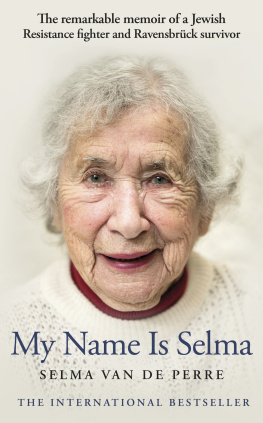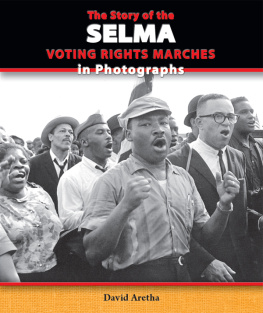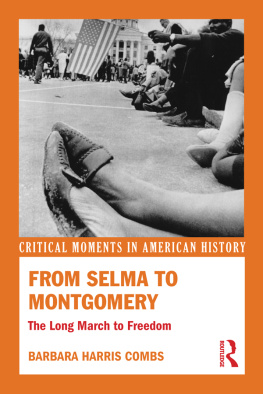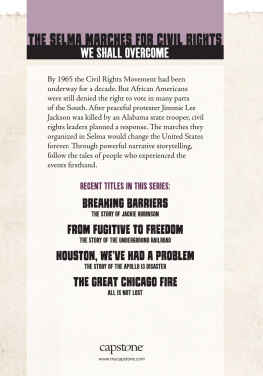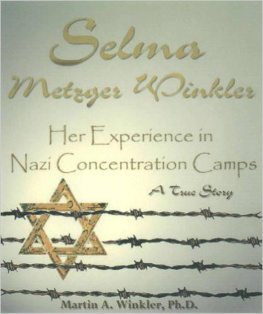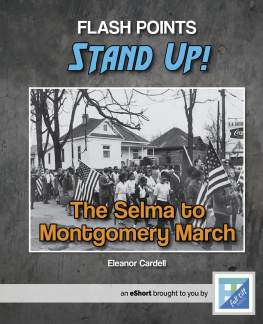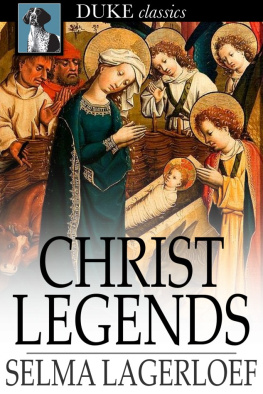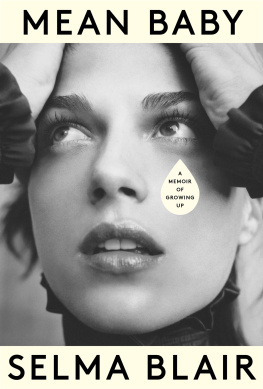Selma van de Perre - My Name Is Selma
Here you can read online Selma van de Perre - My Name Is Selma full text of the book (entire story) in english for free. Download pdf and epub, get meaning, cover and reviews about this ebook. year: 2020, publisher: Transworld, genre: Non-fiction. Description of the work, (preface) as well as reviews are available. Best literature library LitArk.com created for fans of good reading and offers a wide selection of genres:
Romance novel
Science fiction
Adventure
Detective
Science
History
Home and family
Prose
Art
Politics
Computer
Non-fiction
Religion
Business
Children
Humor
Choose a favorite category and find really read worthwhile books. Enjoy immersion in the world of imagination, feel the emotions of the characters or learn something new for yourself, make an fascinating discovery.
- Book:My Name Is Selma
- Author:
- Publisher:Transworld
- Genre:
- Year:2020
- Rating:3 / 5
- Favourites:Add to favourites
- Your mark:
- 60
- 1
- 2
- 3
- 4
- 5
My Name Is Selma: summary, description and annotation
We offer to read an annotation, description, summary or preface (depends on what the author of the book "My Name Is Selma" wrote himself). If you haven't found the necessary information about the book — write in the comments, we will try to find it.
My Name Is Selma — read online for free the complete book (whole text) full work
Below is the text of the book, divided by pages. System saving the place of the last page read, allows you to conveniently read the book "My Name Is Selma" online for free, without having to search again every time where you left off. Put a bookmark, and you can go to the page where you finished reading at any time.
Font size:
Interval:
Bookmark:


SELMA VAN DE PERRE (b. 1922) was a member of the Dutch Resistance organization TD Group during the Second World War. Shortly after the war she moved to London, where she worked for the BBC and met her future husband, the Belgian journalist Hugo van de Perre. For a number of years she also worked as foreign correspondent for a Dutch television station. In 1983 Selma van de Perre received the Dutch Resistance Memorial Cross. She lives in London and has a son.
For my parents and sister
6 September 1944 [to Greet Brinkhuis]
Dear Gretchen,
Im in a cattle wagon with twelve people, in Vught. Probably headed for Sachsenhausen or Ravensbrck. You keep your spirits up. Ill do the same, although I do wish the end was in sight. Ill throw this note out of the train through a crack in the wall. Bye, my darling.
Kisses, Marga
We were ordered to pack up our toothbrushes and other belongings and wait outside. It was clear we were to be taken somewhere else, but where? We didnt know. I thought it would be safer to stay at Camp Vught than to go off into the unknown, so I decided to hide under a mattress. I let the other women go ahead and stayed behind in the barracks, but I wasnt quick enough. The SS guard the Aufseherin turned up while I was still only half hidden. She ordered me to hurry up, dragged me outside by my arm and pushed me into the final wagon. This slight delay worked to my advantage: there werent many women inside that one yet. The others were packed, and the poor women inside including my friends from the camp spent the next three days travelling in terrible conditions.
There were only twelve or so women in my wagon. I didnt know any of them. Some of them were younger in their twenties, like me. They werent political prisoners, as I was, but asocials, whod done something the Germans didnt like. They realized I was different educated, and so on. Most of them turned out to be prostitutes who had been rounded up to be treated for sexually transmitted diseases.
In the camp theyd worked in the kitchen, and had managed to sneak a big box of bread and sausage on board, as well as a barrel of soup. This was a huge stroke of luck; I knew the other wagons wouldnt have any such supplies. But, as they began to bicker over the food some of them wanted to start on it straight away I realized these women clearly didnt appreciate their good fortune.
We assumed we were on our way to somewhere in Germany, but seeing as we didnt know how long the journey would take I thought it would be sensible to ration the provisions. I put this to the other women cautiously, and luckily they listened. They asked me to hand out the food, and I was honoured to do so. I ladled the soup into portions, and sliced the bread and sausage they could see I was doing my best to give everyone an equal share.
There was sufficient space for all of us to sit down on the floor of the wagon, and some of us had a bit of wall to lean against as well. There wasnt much conversation between us. The kitchen girls talked together a bit they knew one another already. As time passed they became a little friendlier towards me they shared some supplies of toilet paper, for instance. And on that paper I hastily scribbled a note to my good friend in Amsterdam, Greet Brinkhuis.
I told her I was on a train that was probably heading for Germany. When we stopped at the first station the last town in the Netherlands before we did indeed pass into Germany I pushed the note through a gap between the wooden planks of the wagons wall. Even though it was very unlikely that the message would ever reach her, it was worth a try.
The journey seemed interminable, even for those of us in that privileged final wagon. I was feeling anxious, but there was also a sense that the war wouldnt last much longer. We knew that the Allies were already at the border. I knew that I couldnt do anything to change what was happening, so I tried not to worry about it too much. There was simply no point.
We slept on the bare wooden floor of the wagon. It was uncomfortable, but it must have been far worse for my friends in the other wagons with fifty or sixty people packed inside they wouldnt even have been able to sit down. And they wouldnt have had any food. Although I didnt realize it at the time, I was lucky.
After three days and two nights locked up in the wagons, we reached our destination on 8 September. The sliding doors of the cattle wagon opened and we caught our first glimpse of what we later found out was Ravensbrck. Ironically, this grim and terrible place is located by a large lake the Schwedtsee in beautiful surroundings, but we couldnt see anything of that. The SS officers waiting for us on the platform had large dogs with them and were brandishing whips. The dogs were barking and the men, as well as the female guards the Aufseherinnen were yelling at us to get out of the wagon.
Schnell, schnell, schnell! Heraus, heraus, heraus!
Quick, quick, quick! Out, out, out!
We were terrified.
Im sitting here in my quiet house in London and looking at a photo taken in 1940. Its of my mother, younger sister and me. Were relaxing in Aunt Saras garden in Amsterdam, which, at that moment, was still a peaceful spot. My mother, whom we fondly called Mams, was fifty-one at the time, my sister Clara twelve, and I was eighteen. Its an everyday snapshot of an ordinary family; we were having a pleasant afternoon, enjoying the garden and one anothers company. A model image of family time: loving, secure, comfortable, predictable. Theres no hint in our faces of what was to come in the following three years: the deaths of my father, mother and Clara; my grandma; Aunt Sara, her husband Arie and their two sons; and so many other family members.
None of these deaths were due to natural causes or accidents. They were the result of the atrocities that were already spreading across Europe when the photo was taken, and which would soon infiltrate the Netherlands. Before those catastrophic events, we hadnt comprehended what a privilege it was to lead an anonymous life. I can still hardly believe that people who should have remained unremarkable ended up memorialized on lists and monuments because they had fallen victim to the most systemic mass murder the world has ever known.
Like most people, I was born into an ordinary family whose experiences were noteworthy only to those involved. My grandpa on my fathers side, Levi Velleman, was an antiques dealer in Schagen. He ran a shop there and another in Haarlem, but he was never a wealthy man. My grandma on my fathers side, Saartje Velleman (ne Slagter), was a housewife, like most women in her day although she didnt quite conform to the stereotype as she wasnt all that good at it. She was a hopeless cook and cleaner, and her eldest daughter, my aunt Greta, told me that the house was always a mess, with clothes thrown haphazardly into drawers, so that no one could find anything. There was a live-in maid who did all the heavy work, but as Aunt Greta grew up she took on more and more responsibility for the general household tasks and cared for her younger brothers and sisters.
Next pageFont size:
Interval:
Bookmark:
Similar books «My Name Is Selma»
Look at similar books to My Name Is Selma. We have selected literature similar in name and meaning in the hope of providing readers with more options to find new, interesting, not yet read works.
Discussion, reviews of the book My Name Is Selma and just readers' own opinions. Leave your comments, write what you think about the work, its meaning or the main characters. Specify what exactly you liked and what you didn't like, and why you think so.

